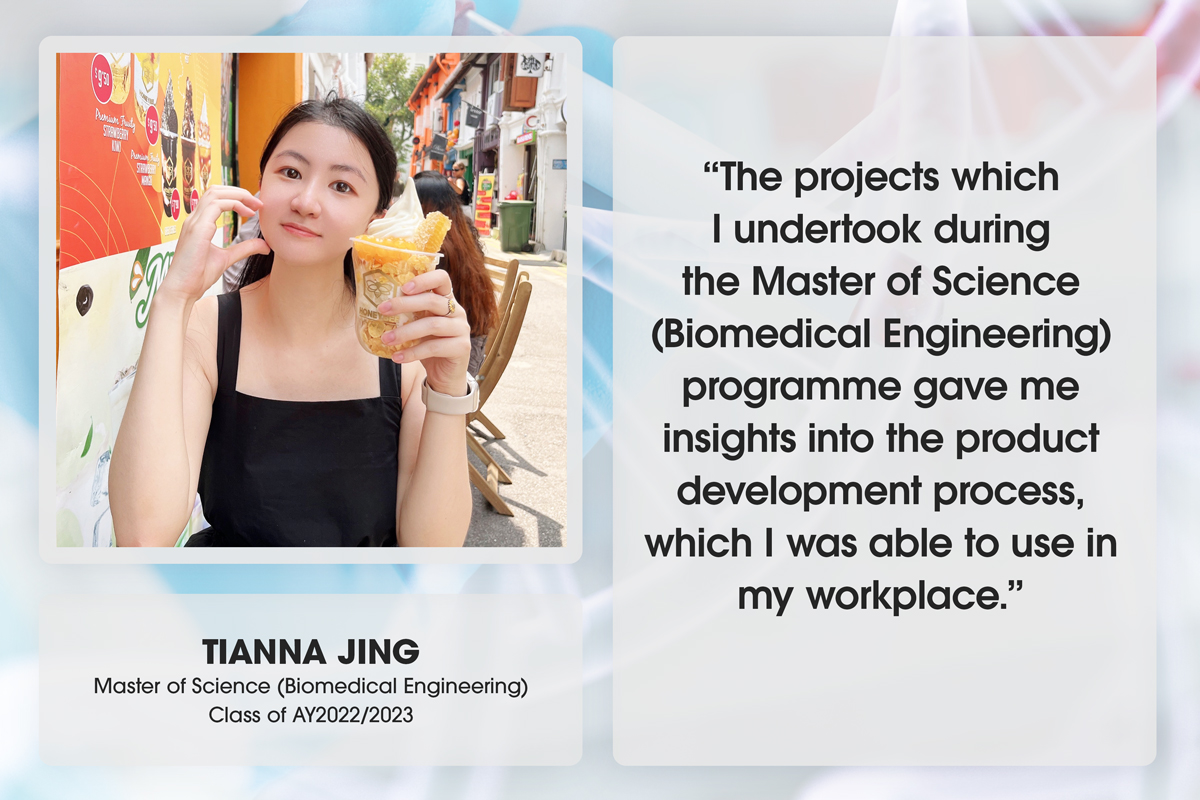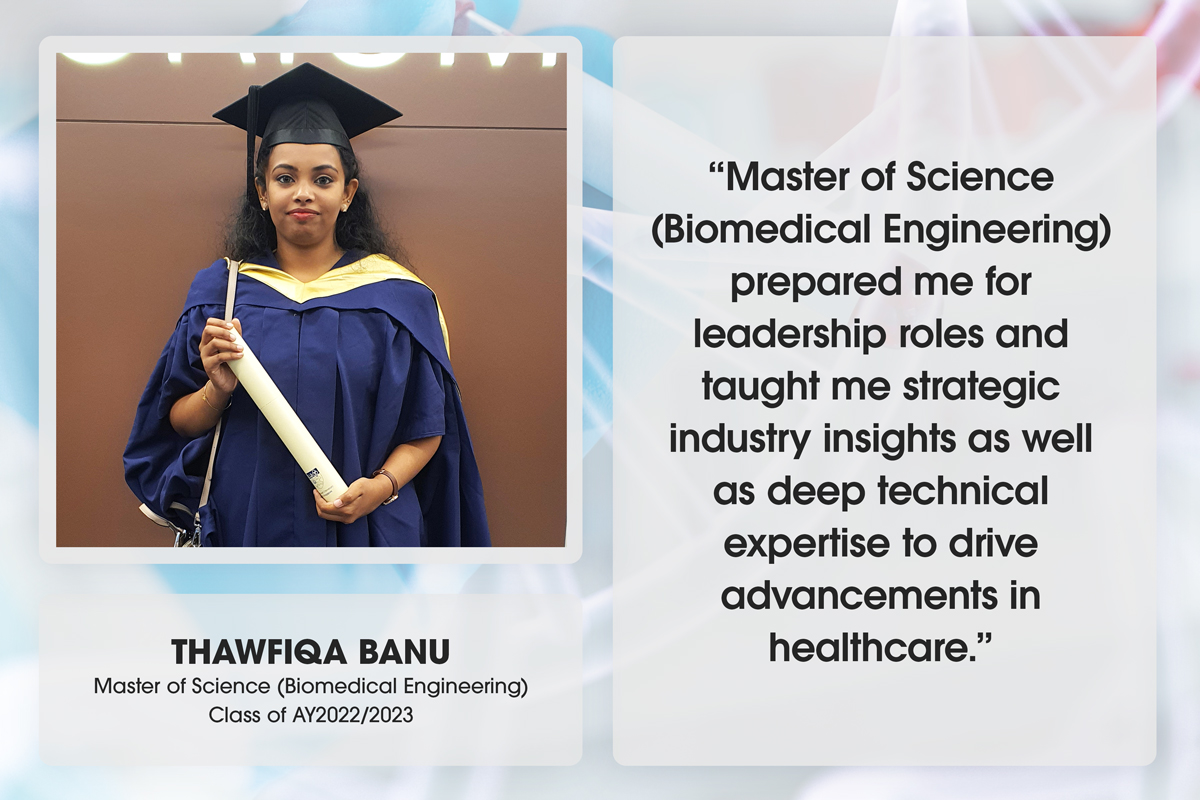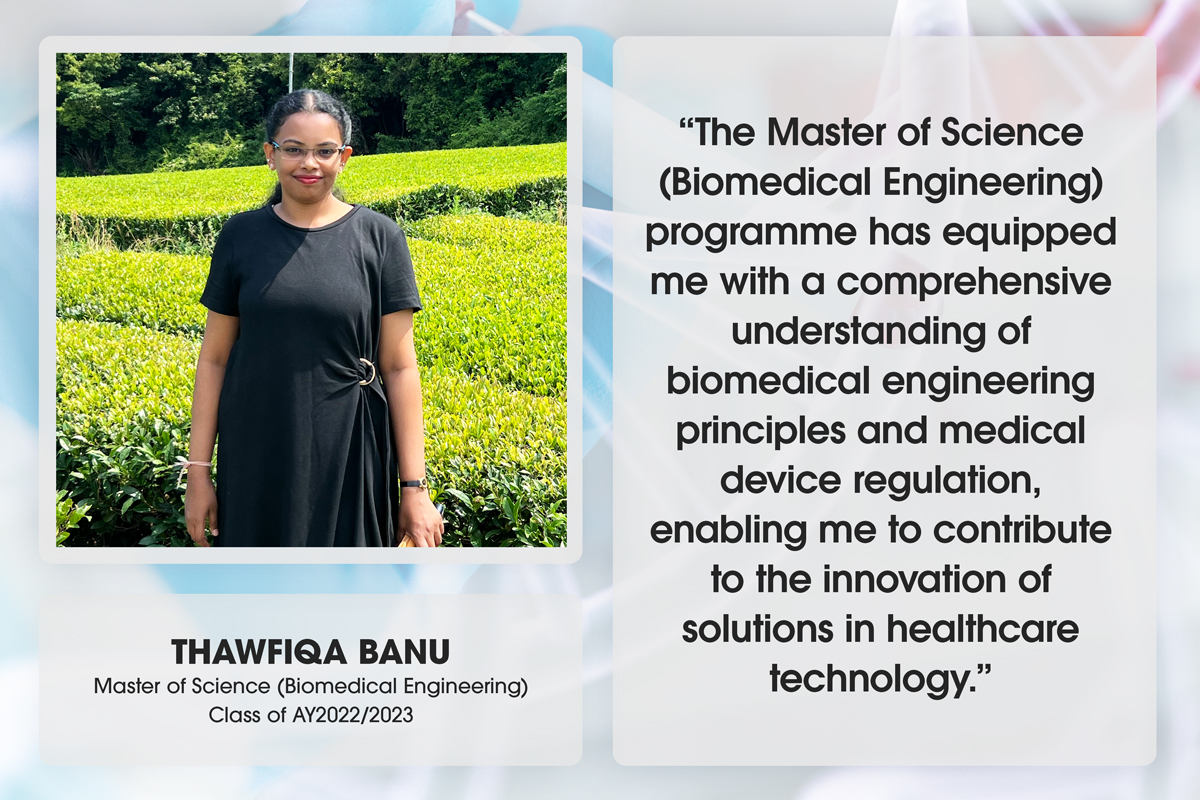
News & Stories
Latest News & Stories
Most people think of engineering as a highly technical field, and have the impression that the people who succeed in this type of work focus on the practical aspects of building or developing something tangible. However, what if that specialised knowledge were not enough? What if something more were needed to really excel in the field? This is what two biomedical engineers with different backgrounds and different career paths came to realise.
Preparing for the Future, Starting Today
Tianna Jing majored in Biomedical Engineering and Medicinal Chemistry at the University of Sydney, and graduated with a degree in Bachelor of Engineering and Science. Being someone who enjoyed problem-solving and translating theory into practical applications, she saw Biomedical Engineering—an interdisciplinary field that merges the principles of engineering with medical and biological sciences to design and create equipment, devices, computer systems, software, and new procedures for healthcare purposes—as a way to develop innovations that would help healthcare professionals to work better and smarter, achieving a higher level of productivity.
However, despite having a degree as well as internship experience at a public hospital, she felt unprepared for the working world.
“I had knowledge foundations in the biomedical engineering field but I lagged in certain areas. For example, I was taught about biomedical regulations in the United States of America (USA) and Australia, but I was not taught about the Asian regulations,” she explained.
Such knowledge gaps gnawed at Tianna, and she felt that she needed to address them, to improve her career prospects as well as solidify her competencies and knowledge. Sifting through her options, Tianna eventually landed on the Master of Science (Biomedical Engineering) programme at the National University of Singapore (NUS).
Over the course of her studies, Tianna was reminded that being a good biomedical engineer sometimes means going beyond just the theory and science. A key experience that stands out in her mind occurred when her team was working on a project for the course BN5501 (Biodesign Process of Innovation in Healthcare), where students use the biodesign process to address and solve real-world problems.
The team was looking into how to avoid retroperitoneal bleeding when collecting bone marrow for examination, and initially focused their attention on the design of the needle used for the procedure. However, their lecturer Dr Mark Chong encouraged them to conduct interviews with doctors to investigate the problem further. Eventually, the team realised that the main issue was not with any of the technology or tools, but with the doctors’ level of confidence using the device.
This made Tianna realise that, as a biomedical engineer, communicating with the healthcare professionals who use the tools and technologies she develops is crucial. Only then can she better understand their needs, identify their pain points and develop products that meet clinical users’ requirements.
Tianna graduated earlier this year and is currently working at United Imaging, a company specialising in the development and manufacturing of advanced medical imaging equipment. Her role as Clinical Application Specialist has her exploring the potential of integrating artificial intelligence (AI) with magnetic resonance technology and leveraging AI solutions to solve clinical problems.
She believes the Master’s Degree played a big part in her landing this role. “The MSc (Biomedical Engineering) has strengthened my understanding of magnetic resonance and medical imaging, providing me with valuable expertise in these areas. Additionally, the various projects undertaken during the programme allowed me to gain insights into the product development process, which facilitated a swift adaptation to my role upon joining the company.”
An Investment in Her Future
Like Tianna, Thawfiqa Banu studied biomedical engineering in her undergraduate days. After graduating from NUS with a Bachelor of Engineering (Biomedical Engineering), she went straight into the workforce as a Technical Support Engineer at a biotechnology start-up. There, she gained hands-on experience in such technical tasks as analysing and troubleshooting electromechanical parts, conducting training for production technicians, and improving quality control procedures.
The Singaporean native saw the growing demand for healthcare innovation and understood the critical role that engineers play in addressing healthcare challenges, not just in Singapore, but across the world. She recognised that the increasing demand for healthcare services gave rise to many opportunities. However, without the necessary preparation, she knew that she would not be ready to make the most of those opportunities.
With her future in mind, Thawfiqa decided to put her career on hold so that she could strengthen her skillset through the MSc (Biomedical Engineering) programme at NUS.

Enhancing Skillsets, Broadening Horizons
Her time as a student in the programme was a fruitful one, with several courses leaving an impression on her. For instance, BN5208 (Biomedical Quality and Regulatory Systems) deepened her understanding of the practices surrounding medical device regulation and quality control.
“As an engineer, this course enlightened me about the ethical and professional responsibilities that we shoulder, whilst working in the medical device domain.” She elaborated. “Understanding local and international regulations is crucial, and the coverage of medical device classification systems (in this course) provided a strong foundation for navigating the complex landscape of device regulation.”
She also enjoyed BN5209 (Frontiers in Neurotechnology), as the course shone a spotlight on the marriage between engineering and neuroscience: neuroengineering. Gaining insights into the innovative tools and techniques that allow the deciphering of the complexities of the human brain, she has developed a deeper appreciation for the potential of neurotechnology to transform the diagnosis, treatment, and understanding of neurological conditions.
Thawfiqa reflected on how the MSc (Biomedical Engineering) has increased her competency as a biomedical engineer, “It has equipped me with a comprehensive understanding of biomedical engineering principles and medical device regulation, enabling me to contribute to the innovation of solutions in healthcare technology. The programme also prepared me for leadership roles and taught me strategic industry insights as well as deep technical expertise to drive advancements in healthcare.”

For Tianna and Thawfiqa, their Master’s Degree has been an important checkpoint in their life journey that has allowed them to give their careers a boost. Both are now equipped with a more comprehensive set of competencies that will allow them to achieve their dreams of contributing to the development of cutting-edge medical technologies related to disease prevention, early screening, diagnosis, treatment, and prognosis. Truly, the two biomedical engineers are poised to not only enhance the well-being of individuals, but also positively impact patient care and the healthcare sector, and thus bring more happiness to people's lives.
Applications for the Aug 2024 intake of the MSc (Biomedical Enginering) programme are open from 1 Oct 2023–31 Mar 2024. For more information, please visit MSc in Biomedical Engineering.
Videos

